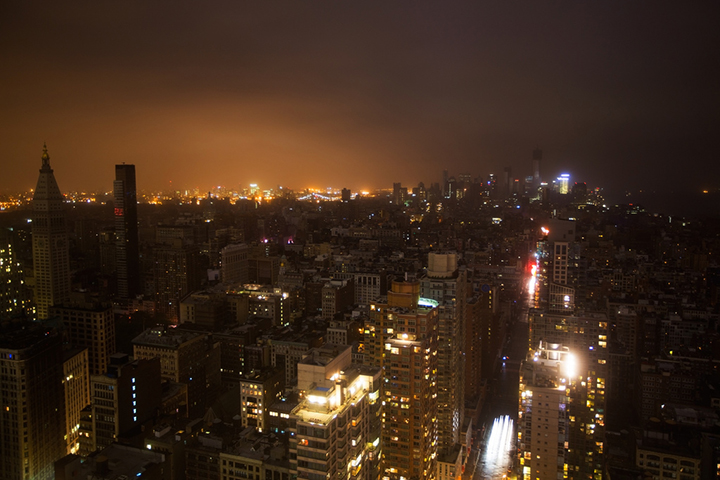A darkened Lower Manhattan is seen after Superstorm Sandy. (Photo used under Creative Commons license from Flickr user Lisa Bettany)
The effects of Superstorm Sandy have put life on hold in many parts of waterlogged New York, and the city’s arts community is no exception.
Richard Maxwell, who studied acting at Illinois State University from 1986-90, lives in Midtown Manhattan with his family, so he escaped the power outages and flooding still hampering downtown.
But the play he wrote and directed, Neutral Hero, wasn’t so lucky. The Kitchen theater in the Chelsea neighborhood of Manhattan, where Neutral Hero is being staged, was hit with 3 feet of water from Sandy, damaging equipment and buckling the floors. Four sold-out performances have been postponed, likely to next week, depending on when power and subway services are restored, said Maxwell.
Chelsea was one of the harder-hit neighborhoods in Manhattan, he said. In addition to theaters like The Kitchen, there are a lot of art galleries in Chelsea, many of them still assessing the damage to paintings and other artwork housed on the ground floor and basements, Maxwell said.
“It’s staggering,” he said. “It’s just untold damage from the flooding.”
Maxwell says there is a feeling of camaraderie in the neighborhood – something he observed firsthand when people volunteered to help clear out debris from The Kitchen. But the strain of gas shortages and power outages is showing, he said. There are still more than 1.3 million New Yorkers without power as of Friday morning, many of them in Lower Manhattan, which is largely still in the dark.
“It’s a city divided because of the power outage downtown,” Maxwell said.
Also canceled this week were performance of Falling, a play directed by Lori Adams, Illinois State’s head of acting in the School of Theatre and Dance. The show about a family dealing with autism — Adams’ off-Broadway directorial debut — opened last month at the Minetta Lane Theatre in the West Village.
The power is out in the West Village, but “no damage was done to the theatre so as soon as electricity is restored (hopefully tomorrow) the show will be up on the boards again,” Adams said in an email.
“It’s a very trying time for NYC,” Adams said.
Calvin Pritner, professor emeritus from the School of Theatre and Dance, lives in Upper Manhattan, at West 169th Street, so he too stayed dry and didn’t lose his power because of Sandy.
He’s been able to move around his neighborhood on foot without any problems, but Sandy’s effect on transportation in New York has been dramatic. The subway system was shut down for days, and Friday was only the second day of limited service. That would’ve made traveling to Lower Manhattan to see shows tricky for Pritner and his wife, Evamarii Johnson, but those shows (including Neutral Hero) were postponed or canceled.
The shutdown subway did keep Pritner from traveling to the Art Students League independent art school on Wednesday, as he planned.
Pritner and Johnson prepared before Sandy arrives, buying batteries for flashlights and stocking up on water. But Pritner is keeping Sandy’s limited impact on his neighborhood in perspective. Sandy has killed at least 92 people in the U.S. as of Friday, and 3.8 million homes and businesses are still without power.
“We’re living with inconvenience rather than real distress,” Pritner said.
Ryan Denham can be reached at rmdenha@ilstu.edu.



